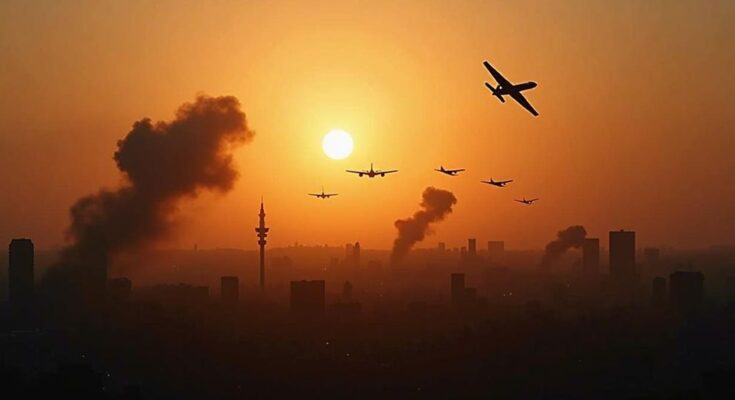Israeli airstrikes have intensified in Beirut and northern Lebanon, targeting Hezbollah as violence escalates following Hamas’s attack on Israel in October. The conflict has led to substantial casualties and a worsening humanitarian crisis in Gaza. Calls for the cessation of military support to Israel have surfaced amid international concerns about the ongoing situation.
Israeli airstrikes targeted Beirut throughout the night, as the Israel Defense Forces (IDF) conducted operations against Hezbollah positions. The Lebanese television station Al-Manar reported significant damage and fires in the southern suburbs of the capital as a result of these strikes. Israel has also intensified its military operations in northern Lebanon, particularly in Tripoli, where Hamas reportedly lost a field commander due to these attacks. Amid escalating violence, French President Emmanuel Macron called on nations to cease the transfer of weapons to Israel amidst the ongoing conflict in Gaza. The Israel-Gaza conflict escalated dramatically on October 7, when Hamas executed an unprecedented assault on Israeli territory, resulting in approximately 1,200 fatalities and numerous civilian abductions. In retaliation, Israel declared war on Hamas, initiating a ground offensive that has led to the largest displacement crisis in the region since the establishment of Israel in 1948. In a significant development, Hamas’s leader, Ismail Haniyeh, was killed in an airstrike attributed to Israel in July 2024. Hezbollah, an Iranian-backed militant group, has been engaged in rising hostilities with Israel over the past year, culminating in Israeli military incursions into southern Lebanon. The recent airstrikes have resulted in heavy casualties, with a reported toll exceeding 1,400 lives lost, including that of Hassan Nasrallah, Hezbollah’s longstanding chief. The history of violence along the Israel-Lebanon border extends back to the founding of Israel, reflecting deep-seated animosities. In the Gaza Strip, Israel’s military actions have led to what many have termed one of the most devastating conflicts of this century, with tens of thousands of casualties and a substantial portion of the population facing dire humanitarian conditions akin to famine. Throughout this crisis, Israel has faced growing pressure from Western allies to facilitate the entry of essential humanitarian aid into Gaza, yet it has maintained a restrictive stance. The United States has continued to support Israel militarily and financially, despite some tensions between Israeli Prime Minister Benjamin Netanyahu and U.S. political leaders, including President Joe Biden. The U.S. government has consistently vetoed or abstained from United Nations resolutions proposing cease-fires, further complicating the international response to the conflict.
The ongoing conflict between Israel and Hamas has roots that extend back more than seven decades, characterized by a complex history of territorial disputes, political power struggles, and deep-seated mistrust. The situation deteriorated significantly on October 7, 2023, when Hamas launched a large-scale attack against Israel, prompting an intensified military response from the Israeli government. Simultaneously, Hezbollah’s involvement has escalated tensions in the region, extending strikes beyond Palestinian territories to include military actions in Lebanon. These developments have wider implications for regional stability, particularly given Lebanon’s history of conflict with Israel and the broader geopolitical dynamics involving Iran’s support for Hezbollah. The humanitarian crisis in Gaza has drawn international attention, with calls for more humanitarian aid often met with Israeli resistance, citing security concerns. The responses of various international players, particularly the United States and European nations, reflect the complexities of the situation as they balance support for Israel with humanitarian considerations and diplomatic efforts to prevent further escalation.
In summary, the situation in Lebanon and Gaza remains dire as Israeli airstrikes target key militant groups in response to ongoing hostilities, primarily with Hamas and Hezbollah. The conflict has resulted in significant loss of life and displacement, exacerbating humanitarian conditions in already fragile regions. Calls for the cessation of arms supplies to Israel by international leaders like President Macron highlight the urgent need for a balanced approach that addresses the immediate security concerns while also prioritizing humanitarian relief and the potential for lasting peace in the region.
Original Source: www.washingtonpost.com




